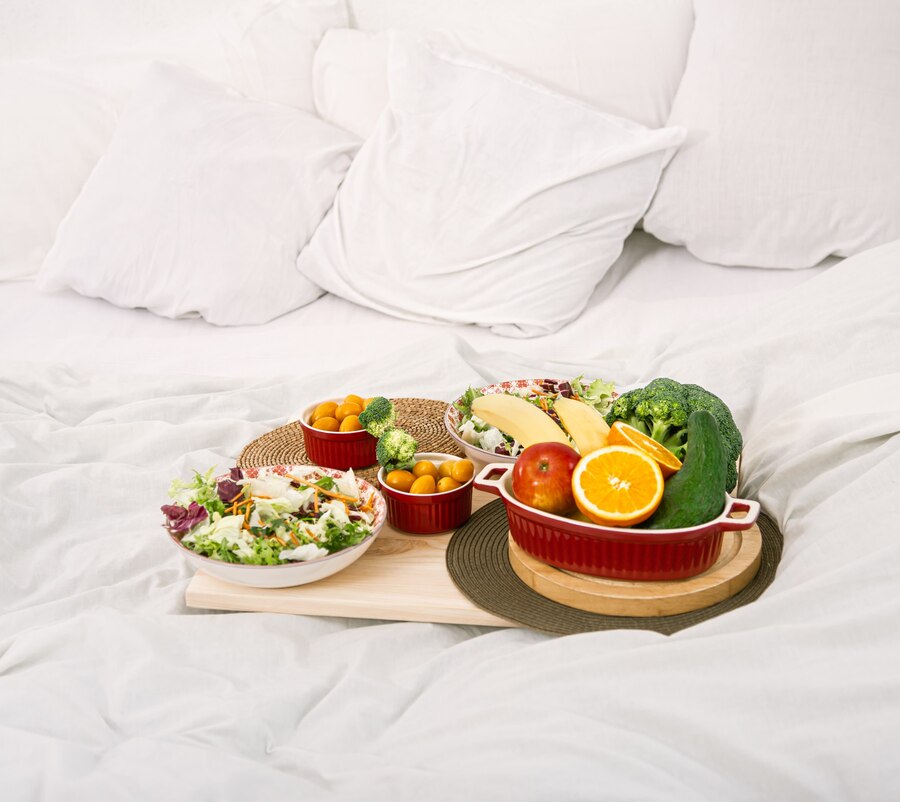Achieving quality sleep requires attention to many factors, from maintaining consistent bedtimes and wake times to ensuring your sleep environment is calming with a comfortable mattress. One often-overlooked factor in getting restful sleep is nutrition—what and when you eat plays a significant role in how well you sleep.
Curious about how diet or specific nutritional strategies can improve your sleep health? Keep reading to explore how food influences sleep quality, the link between sleep and weight loss, and dietary adjustments that could enhance your rest. Plus, we’ve included additional reading materials and resources on sleep and nutrition at the end!
Table of Contents
-
Nutrition’s Impact on Sleep
-
Foods and Drinks That Can Aid Sleep
-
Foods and Drinks That May Disrupt Sleep
-
Meal Timing and Sleep
-
Weight, Sleep, and Nutrition Connections
Nutrition’s Impact on Sleep
Nutrition is crucial for overall health, affecting everything from muscle recovery to brain function. Yet, research on how specific foods influence sleep is still growing. Some studies suggest certain foods can help you fall asleep faster, but conclusive evidence is still scarce.
Foods and Drinks That Can Aid Sleep
Certain foods may help with sleep by making you feel sleepy, falling asleep more easily, or improving sleep depth. However, it’s essential to give your body enough time to digest any pre-bed snacks—about 30 minutes before lying down works well.
Here are some common sleep-promoting foods and beverages:
-
Chamomile Tea
Chamomile tea is widely recognized as a calming pre-bed drink. While studies show chamomile may have mild sedative effects, there’s limited data on its specific impact on sleep. Still, drinking any warm, non-caffeinated beverage can signal to your body that it’s time to wind down. -
Tart Cherry Juice
Preliminary research indicates tart cherry juice may improve sleep. A 2012 study showed that drinking tart cherry juice raised melatonin levels and increased time spent in bed, total sleep duration, and sleep efficiency. -
Almonds
Rich in magnesium and tryptophan, almonds support muscle relaxation and promote the production of calming hormones like serotonin and melatonin. -
Bananas
Bananas are packed with magnesium and potassium, which help relax muscles, as well as tryptophan, which converts into serotonin and melatonin. -
Orange or Pineapple Juice
A study in the Journal of Pineal Research found that tropical fruit juices like orange and pineapple can help increase melatonin levels, aiding sleep. -
Magnesium-Rich Foods or Supplements
Magnesium plays a role in relaxing the nervous system. Foods like lentils, bananas, almonds, and pumpkin seeds are excellent sources of magnesium. -
Jasmine Rice or High-Glycemic Foods
A small 2007 study indicated that eating high-Glycemic foods like Jasmine rice before bed helped participants fall asleep faster than those who ate low-Glycemic options.
More Research is Needed
While some foods show promise for promoting sleep, more studies are needed to fully understand the relationship between nutrition and sleep. Many studies have been small or short-term, preventing definitive conclusions. However, research supports the idea that a diet rich in fruits, vegetables, whole grains, and healthy fats is beneficial for sleep.
Foods and Drinks That Can Disrupt Sleep
On the other hand, certain foods and drinks can interfere with your ability to fall asleep and stay asleep.
-
Caffeine
Caffeine is the most well-known sleep disruptor. While consuming up to 400 milligrams per day (about four cups of coffee) is generally safe for most adults, some people are more sensitive to caffeine. This sensitivity can affect sleep, even when caffeine is consumed earlier in the day.
Studies also suggest that long-term, regular caffeine consumption may negatively affect sleep quality, especially in older adults. Caffeine is not just found in coffee but also in tea, sodas, energy drinks, and even chocolate.
-
Acid Reflux Triggering Foods
Acid reflux (GERD) occurs when stomach acid backs up into the esophagus, often causing heartburn. Eating large meals, drinking alcohol, or consuming spicy or fatty foods can trigger acid reflux. Since nighttime acid reflux can disturb sleep, it’s recommended to avoid eating for at least two to three hours before bed. Common culprits include spicy foods, high-fat items, and alcohol.
Meal Timing and Sleep
Though most information on how diet affects sleep is anecdotal, meal timing can play a role in your ability to fall asleep. The relationship between meal timing, metabolism, and circadian rhythms is still under study, but there’s evidence that the timing of your last meal before bed matters.
-
When to Stop Eating
It typically takes around three hours to digest a meal, so stopping eating at least two to three hours before bed is a good practice. Eating too close to bedtime can interfere with sleep, especially if you’re consuming heavy or rich foods. -
Snacking Before Bed
If you feel hungry before bed, it’s best to opt for snacks high in protein or fiber—foods like nuts, yogurt, hummus, and whole grains are great choices. Avoid foods with caffeine, such as chocolate, and stay away from sugary snacks.
Weight, Sleep, and Nutrition Connections
Sleep and nutrition are closely intertwined with weight. Poor sleep is linked to stress, food cravings, and overeating, which can impact weight and body composition. Conversely, being overweight can contribute to sleep disorders like sleep apnea, as excess weight can put pressure on the airways.
-
Sleep Deprivation & Nutrient Deficiencies
New research suggests that people who sleep less than seven hours a night are more likely to have deficiencies in essential vitamins and minerals. Nutrient deficiencies may contribute to sleep disturbances or disorders. If you find you’re consistently under-sleeping, a lack of key nutrients might be part of the problem. -
Sleep Deprivation & Food Choices
Lack of sleep can also lead to poor food choices. Studies show that sleep-deprived individuals tend to crave high-calorie, less nutritious foods. If you’re trying to curb sugar intake, improving your sleep habits might help—research has found that better sleep leads to reduced sugar consumption.
Additional Resources
-
Meal Timing for Sleep
The timing of your meals can impact sleep quality. It’s best to stop eating large meals two to three hours before bed. -
The Impact of Diet on Sleep
Several popular diets—such as the Mediterranean diet—are linked to better sleep. A balanced diet filled with fruits, vegetables, lean proteins, and healthy fats promotes restful sleep. -
Sleep and Vitamins
Certain vitamins, particularly Vitamin D, play a role in sleep regulation. Make sure you’re getting enough of these nutrients to support healthy sleep.
Improving your sleep with nutrition involves making mindful food choices and being aware of when you eat. Experiment with meal timing and include sleep-promoting foods while avoiding sleep disruptors. With a little attention to your diet, you can potentially enhance both the quality and quantity of your sleep.



